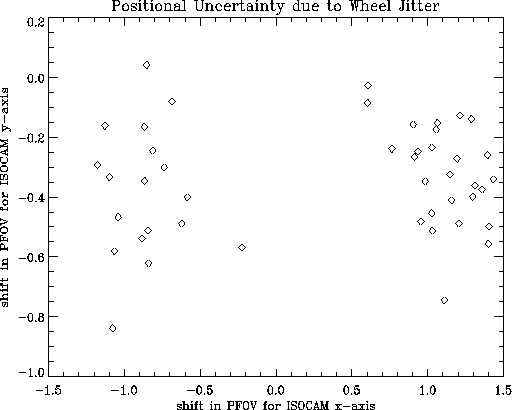




Next: 4.12 Instrumental Polarisation
Up: 4. Calibration and Performance
Previous: 4.10 Field of View
4.11 Astrometric Uncertainties
Due to the superb pointing accuracy of the ISO telescope, the
astrometric uncertainties should be small, even when considering
the pincushion distortion (up to 1 pixel for the 6
 pfov, and 0.5 pixels for the 3
pfov, and 0.5 pixels for the 3
 pfov). However,
operating the instrument at liquid helium temperatures, and
accommodating severe launch vibrations, required mounting the camera
wheels with a small amount of positional `play'. This translates
into some unrepeatability in the position of a wheel at the end of
each motion. This `wheel (positioning) jitter' may cause an
apparent shift of the source position by up to 2 pixels from the
nominal pointing position (see Figure 4.28).
Such a shift may be associated with any change in optical
configuration. Mainly, it occurs only by moving the lens wheel and
remains unchanged for rotations of the filter wheel. For most
observations, the lens wheel was not moved during
the measurement (AOT). In this case one has to allow only for a
constant shift of the absolute astrometry in the resulting map or
image.
pfov). However,
operating the instrument at liquid helium temperatures, and
accommodating severe launch vibrations, required mounting the camera
wheels with a small amount of positional `play'. This translates
into some unrepeatability in the position of a wheel at the end of
each motion. This `wheel (positioning) jitter' may cause an
apparent shift of the source position by up to 2 pixels from the
nominal pointing position (see Figure 4.28).
Such a shift may be associated with any change in optical
configuration. Mainly, it occurs only by moving the lens wheel and
remains unchanged for rotations of the filter wheel. For most
observations, the lens wheel was not moved during
the measurement (AOT). In this case one has to allow only for a
constant shift of the absolute astrometry in the resulting map or
image.
Figure 4.28:
Positional uncertainty due to the lens wheel
jitter
|
|





Next: 4.12 Instrumental Polarisation
Up: 4. Calibration and Performance
Previous: 4.10 Field of View
ISO Handbook Volume II (CAM), Version 2.0, SAI/1999-057/Dc
